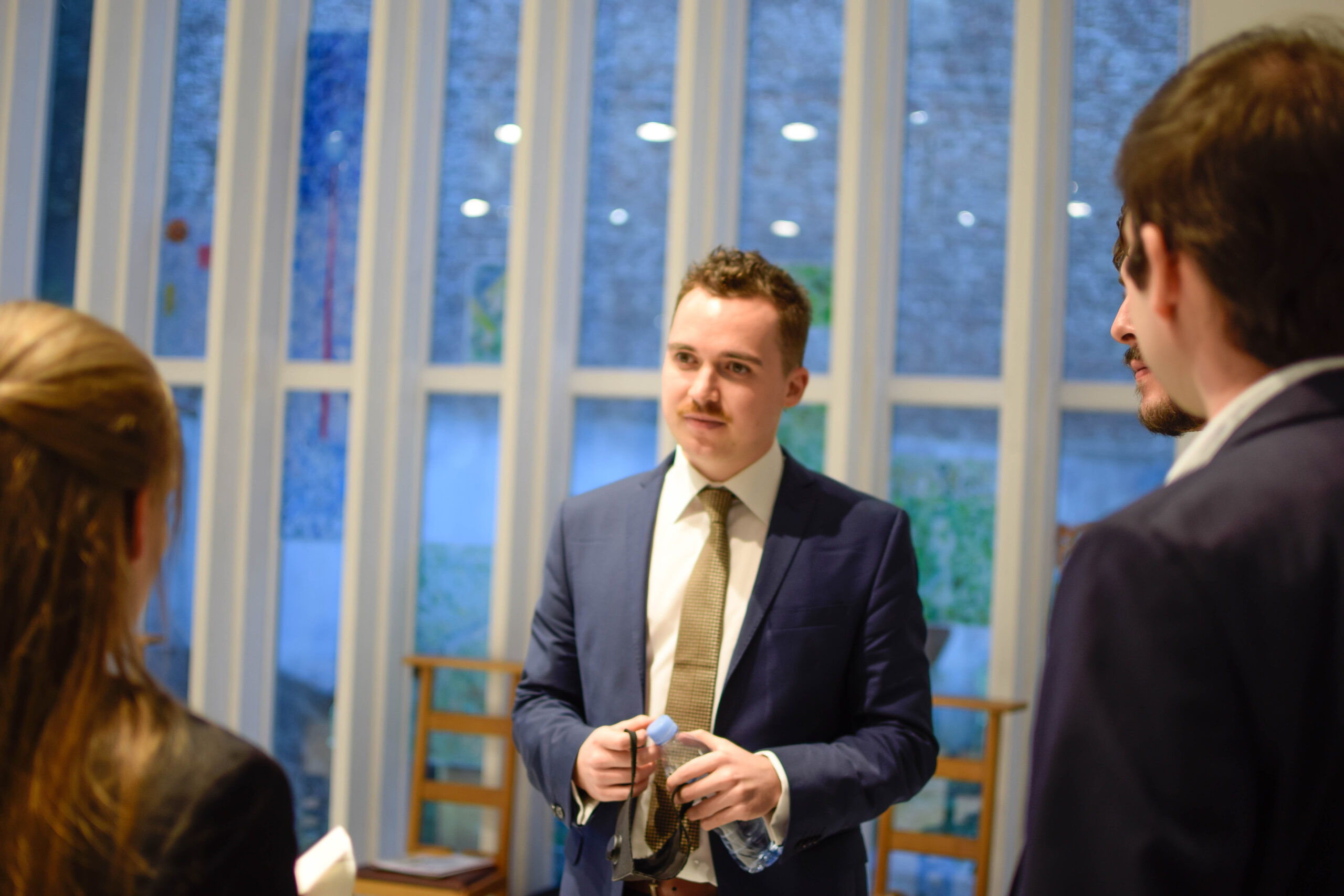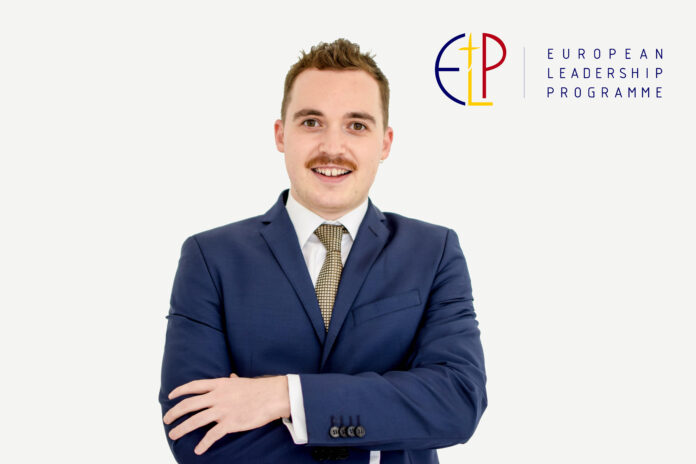The European Leadership Programme is about personal and professional growth. It opens a career pathway for those who want to become European leaders. It also gives them the possibility to decide how to manage their life in Brussels and define their learning process. The ELP involves commitment, effort, interest, curiosity, meeting deadlines, participation in sessions and discussions and community life. With the purpose of inaugurating its 4th edition, the European Leadership Programme (ELP) will interview the Fellows to share their impressions, expectations, ambitions and general thoughts linked to the Programme and their new life in Brussels, the EU Capital. leader
Name: Lukács Dániel Hayes
Country: Hungary
Traineeship placement: everis’ Public Sector Consulting Division
Who are you? We want to get to know you.
Tell us a bit about yourself.
I am a half-English, half-Hungarian young professional from Budapest. Although I am from a blended family, I have lived most of my life in Hungary and did all my studies there, hence developing a strong Hungarian identity complimented with an esteem for European values and ways of life. I have an academic background in sociology and social policy as well as political science, the latter derived from being a graduate student at the Central European University. I am also an alumnus of Rajk College for Advanced Studies, where, apart from many other extra-curricular activities, I had the chance to broaden my theoretical scope within the field of social sciences.
I came to develop my political consciousness under Viktor Orbán’s reign which gradually hollowed out various democratic institutions in Hungary throughout the past years. This has significantly shaped my interests and the decisions and paths I chose to take. I long ago decided that I would like to have a career in the public/civil sphere, and I have gradually been drifting towards a pathway within Hungarian domestic politics. I still have some concerns and fears of joining mainstream politics, especially in a rather hostile and toxic context such as the Hungarian, and I am still unsure as to where I will end up, but I feel a sense of urgency to join and continue the fight against Orbán to try to make Hungary a freer, more open-minded place, where diversity is seen as a virtue, not as something exploitable by politics through strengthening division.
Describe yourself in three words.
Enthusiastic, Curious, Competitive.

What are your interests or hobbies outside of work?
I struggled with sustaining a proper hobby during university and my interests closely align with my academic/professional interests (boring…) That said, I used to play a lot of sports growing up, football and rugby, notably. After years of physical neglect, I have started a new hobby, running, during the first wave of Covid and have stuck to it ever since. I will, hopefully, complete my fist half-marathon this coming spring if all goes according to plan.
Do you have any inspirational person or quote?
The person who has inspired me in many different ways is Professor Attila Chikan, founder of Rajk College for Advanced studies, my alma mater. Professor Chikan is one of the most influential figures in Hungarian political, economic and intellectual circles. Professor Chikan was Minister of Finance and Foreign Trade in the first, Orban government at the end of the 90’s, which was then still a pro-EU liberal administration. He was also Rector of Hungary’s Economics and Social Science University (Corvinus University of Budapest today). Even though Professor Chikan is a widely praised statesman, acknowledged both in Hungary and beyond, his biggest achievement (which he often emphasises) was laying down the foundations of the Hungarian Colleges of Advanced Studies. His life’s work has been to teach and inspire consecutive generations of leaders. It is a less know fact that the foundations of the ELP can also be traced back to Professor Chikan. Without him being affiliated with the Jesuits, many of his core principles mirror Jesuit teaching.
From Attila Chikan I have learnt how striving for excellence is one of the most important defining characters of a leader, as is staying dedicated to one’s cause and always remembering to serve it rather than exploiting it. Professor Chikan is also a living testament to how one can achieve so much in life and be widely praised for it but remain humble and selfless, making his legacy that much more sincere and unique.
What motivates you in life/ What are you passionate about?
The year 2020 for me was full of ups and downs, as it probably was for most of us. But one thing that I really appreciated was that, for the first time in years, I finally had some time for introspection. I had pretty turbulent years while at university and enjoyed never really having to be on my own. I am quite the extrovert, and I get a constant buzz and a sense of joy being around others. On the contrary, I can often get down when I am alone and usually seek to be with others if I have the chance. I am usually motivated by the communities I am part of and, so far, I was fortunate enough to be part of close-knit communities of inspiring, outstanding and motivating peers and mentors. Because I am inherently competitive, I always strive to excel and live up to formal and informal expectations and performance measurements.
Career Goals
- How would you describe your ideal job and how ELP can help you achieve that?
My ideal job would be somewhere in either Hungarian public administration or politics/decision making. I think I would rather prefer to start out in the former, preferably working on something related to social policy. I am a bit reluctant to enter mainstream politics without at least some practical expertise in a given field. Unfortunately, as it stands now, I am not prepared to work for a ministry under the current administration and it is also quite likely that they would not welcome me anyway (my academic and professional profile is quite clearly incompatible with the character of the present Hungarian public administration). Not a great match… However, I am hopeful that things are gradually changing in Hungary and I want to take up my share of the burden to further facilitate this change. More on this later.
I truly believe that through participating in the programme, I am gradually becoming a better and more mature (aspiring) leader due to interactions with very inspiring people; most importantly my spiritual coach, Mr Michael Kuhn, whose guidance has been enlightening in many ways and whose insights I cherish.
- What are your short and long-term career plans?
I have already hinted at as to what my short terms plans are in the previous section, but I can provide slightly more detail here. In the immediate short term (after graduating from the ELP) I have plans to move back to Hungary. I am currently seeking part-time employment for when I return. The idea for me on the short term is to have a flexible work schedule because I plan to put much effort into Momentum – an up-and-coming political party in Hungary of which I am a member – as possible. At this point, any part-time job that is half decent can support me would suit my needs, because I plan to develop professionally within Momentum in the short run, which I feel could benefit both myself and the party. General elections in Hungary are coming up in 2022 and I think if things go right with regards to the united opposition (within which Momentum could be a potential power broker) then I hope that things will change for the better. I am much less certain about my long-term career plans, but I am pretty sure it will be within Hungarian politics one way or another.
ELP Programme (aspirations and expectations)
What was your motivation to apply to the ELP?
I have a good friend who was a Fellow in a previous cohort, so I knew a reasonable amount about the programme before applying. I also knew, and highly respected Botond Feledy, through him being an Advisor to Rajk College and regularly attending panel discussions on various topics throughout the past years. I sort of took his name as a guarantee that the ELP is a worth-while place to develop as a young professional and I was looking forward learn and develop under his (and others) guidance.
When I graduated from my masters, I still wasn’t sure as to whether I would make my way to Brussels or stay in Hungary, but I applied to the programme anyway. I made the final decision to relocate to Brussels when I got the Fellowship offer from the ELP, so, I guess, we could say that the Programme was the main factor behind my 5-months-long visit to the capitol of Europe.
Did your experience so far meet your general expectations of the Programme?
In one word, absolutely. I am more than glad that I applied to the ELP and even more so that I was accepted. I truly think that what the ELP offers us, Fellow, is unique and valuable. A caveat of course is the Covid-19 pandemic. To be honest, I was a bit disappointed with how things worked out right after arriving to Brussels. This, of course, has nothing to do with the Programme. Part of my disappointment was specifically because I understood, very shortly upon my arrival, how much the Programme actually has to offer, particularly in terms of connecting us with extremely influential and inspiring leaders (mostly from the EU bubble). The source of my frustration was that I would have loved to meet some or all of these leaders in person which, naturally, was not possible. But I pretty soon came to the conclusion that this was the best possible place for me to be in even amidst this pandemic. Instead of feeling sorry for myself for missing out on some of the aspect that the ELP offers to Fellows during “normal times” I started appreciating (and taking advantage of) the numerous opportunities provided by the Programme under current circumstances.

What is the biggest challenge that you face so far (overall)?
The biggest challenge to me so far was to adopt to remote working. Unfortunately, by the time I started my traineeship at everis in October, the offices had closed due to someone’s Covid-19 infection at the office and it has not reopened since due to governmental restrictions. Thus, from day one, I started my traineeship journey in a virtual workplace, which was very hard to get used to. To this day I hardly know anyone at the company, only those with whom I am directly linked through working on the same projects. And even with them, I discuss work-related issues for the most part. As a rather sociable person this was hard to get used to at the beginning, but I think I got the hang of it after a few months and now I even enjoy some aspect of remote working. Nevertheless, I think that when life returns to normal, I won’t be someone sticking to remote working. I imagine working somewhere where the working environment resembles that of a community of friends. I know this is possible because I was lucky enough to experience this in the past and will do my best to realise this in the future.


